Disruptive algorithm updates have shaken up Google’s SERPs over the years.
Remember Penguin, Panda, Caffeine and May Day?
Google’s updates typically begin as a narrow attempt to solve an individual problem, then broaden and gain names before being absorbed into the core ranking algorithms.
Despite the dynamic nature of search, Google’s commitment to tackling spammy web content remains unchanged.
Understanding Google’s search psyche becomes crucial as AI revolutionizes search and our lives.
Let’s examine the common threads between Google’s past and present updates to understand the actions and content that Google values.
Google Search Generative Experience vs. Knowledge Panel
This is perhaps the most obvious comparison we can draw. These two updates are broadly similar in how those in the search community reacted to them.
Recently, we have Google’s Search Generative Experience preview. We also have various articles from Google, bringing SGE and Bard (Google’s AI product) closer together.
Here is one of the animated previews which Google has shared:
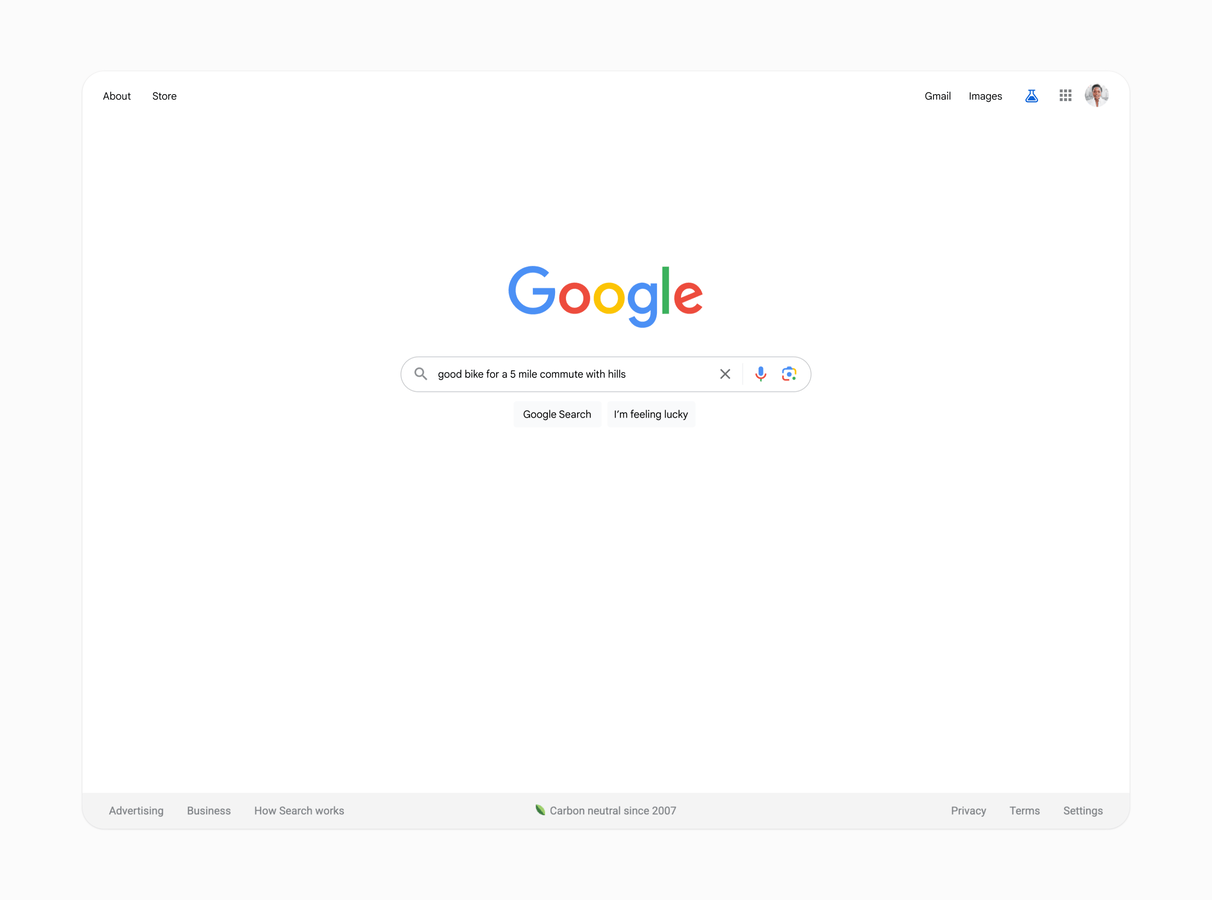
The preview sparked panic among SEOs, as it indicated limited space for organic search links.
Search marketers feared that SEO (and potentially paid search) would become obsolete without clickable elements.
It wasn’t long before language became apocalyptic, and people started declaring search to be dead again:
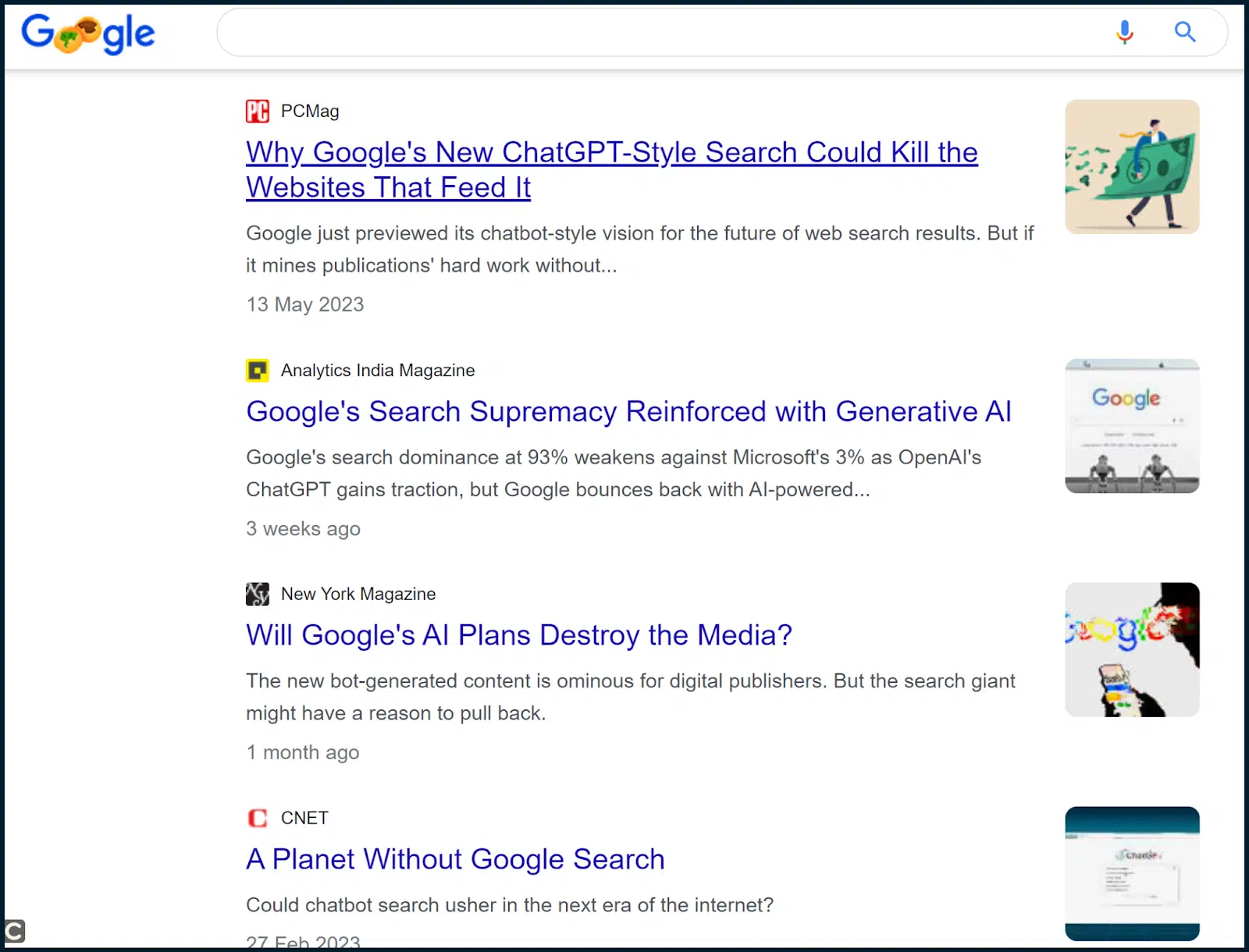
A certain FAQ update started blowing up on Twitter, as Google documentation confirmed that Bard “rarely lists citations and links to content creators.” (More coverage from Barry Schwartz’s report)
Search professionals were concerned that Google would effectively stop delivering traffic to the broader web with fewer organic link placements and a lack of direct citations.
To me, that seems unlikely. Google’s entire revenue model is based on pay-per-click advertising.
That’s not to say that things couldn’t work differently. (i.e., Pay to have your brand referenced more often by an AI within more relevant chats – forget keywords!)
However, it takes time for such technology to spread globally.
Hence, I wouldn’t expect Google’s advertising model to change overnight.
We’ll undergo a period of adaptation to new technologies.
Our roles may involve more prompt crafting and shifting ad approaches using AI recommendations instead of keywords and links.
Despite changes, search will continue, albeit in a significantly different way.
Does this ring a bell? In 2012, Google launched knowledge panels.
This relied upon Google’s previously released Knowledge Graph (a behind-the-scenes system to contextualize information and group it into entity form) to extract specific information directly into search results instead of linking to the hosting webpage.
Since then, it has gone through many evolutions.
When the knowledge panel was first released, it looked roughly like this:
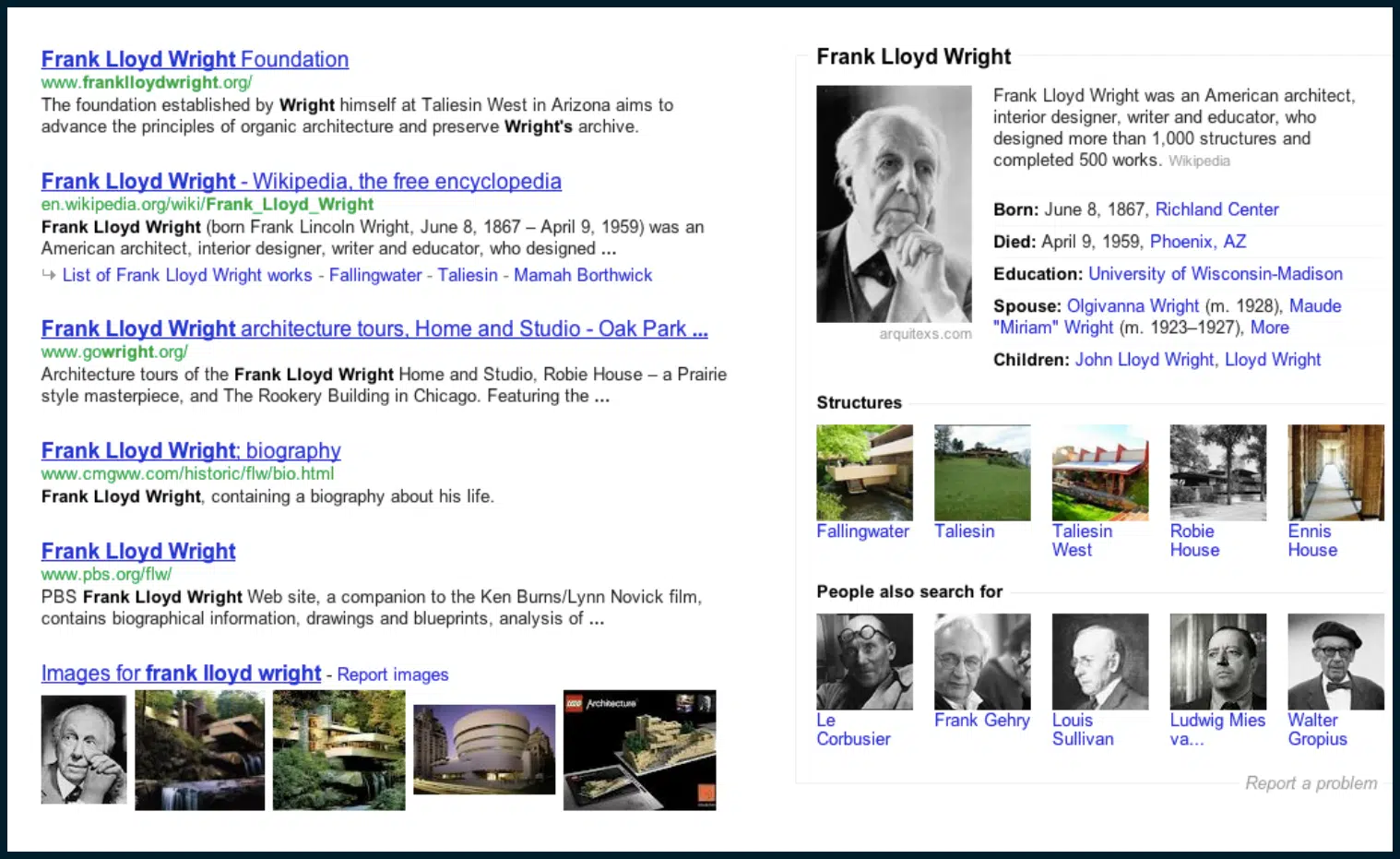
So, there were still plenty of organic links. But it was a huge visual shift, giving more search real estate (especially within informational query spaces) to pure information.
These days, knowledge panels can take a variety of forms:
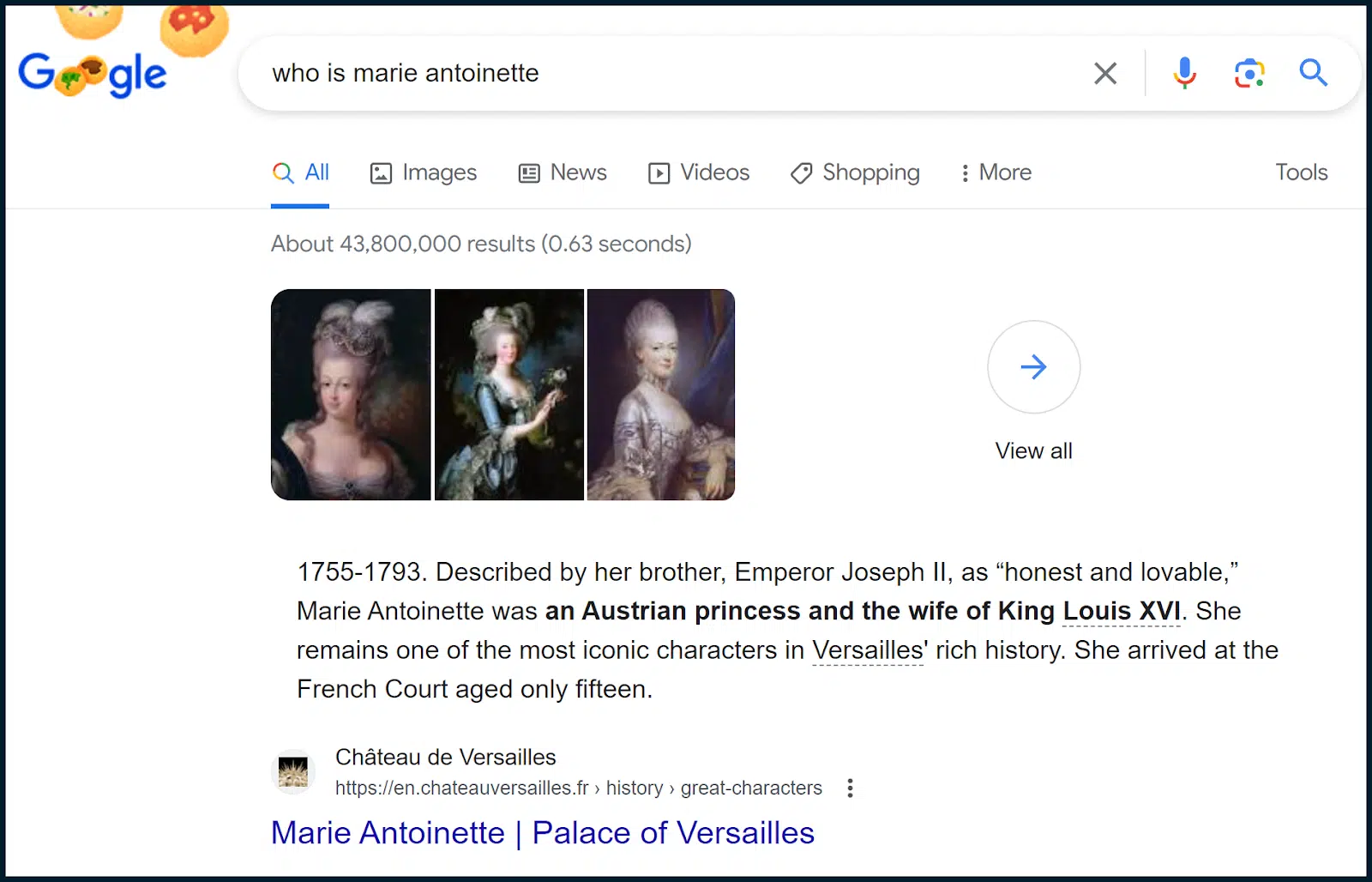
There’s no need to click the citational link in many cases as knowledge panels provide the required information directly.
While knowledge panels may not always be as aggressive, they often nullify the need to click, especially for highly informational queries.
Knowledge panels were released in 2012, before AI became mainstream. Even then, there were many SEOs forecasting doom and gloom.
But here we are, 11 years later, and search still exists.
Google still delivers traffic to websites.
SEO isn’t dead.
So just as the knowledge panel, even in its more advanced form, failed to kill search, I suspect the same will hold true for Google’s SGE and Bard deployments.
Still, that doesn’t guarantee a golden future.
We all need to adapt, and there might be a decrease in clicks that we must manage or find alternative advertising methods.
However, AI isn’t a disastrous meteor ending our careers.
Just as the era of information retrieval (IR) came before SEO, SEO will evolve into something else.
Get the daily newsletter search marketers rely on.
Google Helpful Content vs. Panda
Here, we can draw a very obvious comparison.
In August 2022, Google began talking about a “Helpful Content” system, which had the following aims:
“The helpful content update aims to better reward content where visitors feel they’ve had a satisfying experience, while content that doesn’t meet a visitor’s expectations won’t perform as well.
How can you ensure you’re creating content that will be successful with our new update? By following our long-standing advice and guidelines to create content for people, not for search engines. People-first content creators focus first on creating satisfying content, while also utilizing SEO best practices to bring searchers additional value. Answering yes to the questions below means you’re probably on the right track with a people-first approach:
- Do you have an existing or intended audience for your business or site that would find the content useful if they came directly to you?
- Does your content clearly demonstrate first-hand expertise and a depth of knowledge (for example, expertise that comes from having actually used a product or service, or visiting a place)?
- Does your site have a primary purpose or focus?
- After reading your content, will someone leave feeling they’ve learned enough about a topic to help achieve their goal?
- Will someone reading your content leave feeling like they’ve had a satisfying experience?
- Are you keeping in mind our guidance for core updates and for product reviews?
Avoid creating content for search engines first
Our advice about having a people-first approach does not invalidate following SEO best practices, such as those covered in Google’s own SEO guide. SEO is a helpful activity when it’s applied to people-first content. However, content created primarily for search engine traffic is strongly correlated with content that searchers find unsatisfying.”
Many SEOs will recognize much of the above from Google’s legacy Panda updates.
Google still often references the update by name.
This 2011 blog post provides insights into the update’s initial release notes (even though Panda wasn’t referred to by its name then).
“Our goal is simple: to give people the most relevant answers to their queries as quickly as possible. This requires constant tuning of our algorithms, as new content—both good and bad—comes online all the time.
Many of the changes we make are so subtle that very few people notice them. But in the last day or so we launched a pretty big algorithmic improvement to our ranking—a change that noticeably impacts 11.8% of our queries—and we wanted to let people know what’s going on. This update is designed to reduce rankings for low-quality sites—sites which are low-value add for users, copy content from other websites or sites that are just not very useful. At the same time, it will provide better rankings for high-quality sites—sites with original content and information such as research, in-depth reports, thoughtful analysis and so on.
We can’t make a major improvement without affecting rankings for many sites. It has to be that some sites will go up and some will go down. Google depends on the high-quality content created by wonderful websites around the world, and we do have a responsibility to encourage a healthy web ecosystem. Therefore, it is important for high-quality sites to be rewarded, and that’s exactly what this change does.”
Google’s aim remains unchanged: they rely on a useful search engine for revenue.
If “created for SEO” content dominates search results, users face more spam, leading to decreased usage and ad revenue loss.
It’s shocking how similar the rhetoric is between Panda’s original release and the Helpful Content update.
The tone of voice has changed somewhat, but the key points remain the same:
- Google is aware that a healthy web ecosystem benefits them. While you may not trust Google or any large corporation, it is in their best interests not to eat their own audience (something that will remain true as they deploy AI).
- Produce helpful, useful content for end users. Don’t produce content for the sake of SEO (or search engines).
- Google tries to keep an eye on how drastically individual updates impact their collective query spaces. Google tends to progress cautiously and incrementally, giving us time to adapt.
- Users have tasks to complete when they are online. How does your content help users to complete their objectives? Focus on that when producing your content.
- Even with AI’s power, Google needs human-produced content to learn from the web. Without it, there will be no new material for their AI to learn from and online information/news will stagnate, rendering Google’s search engine useless.
And if you think that AI will eventually learn from itself and eliminate the need for human-produced content, initial tests in that area have not been successful:
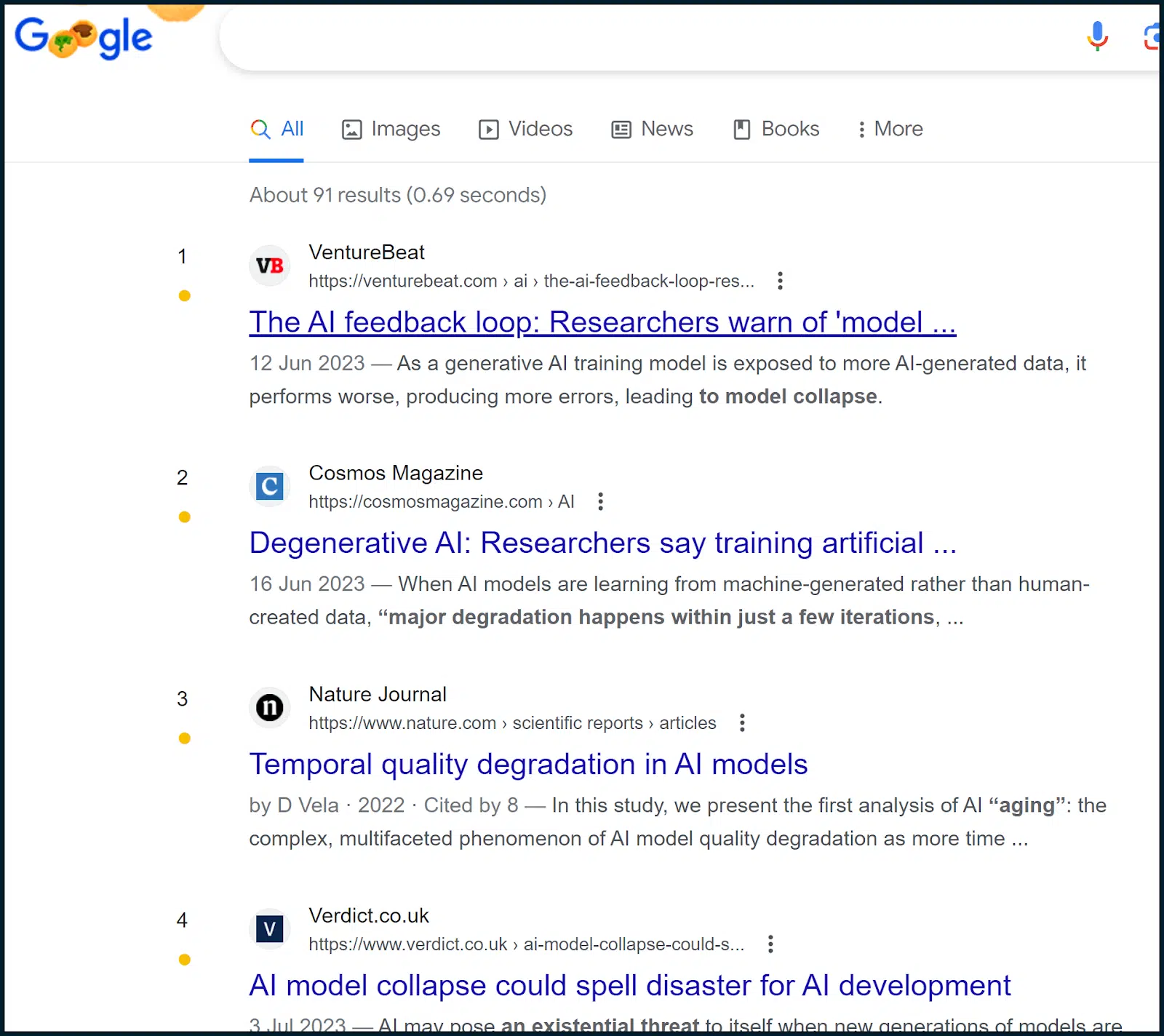
It seems that when AI feeds off itself, the integrity of the produced material rapidly degrades.
Examining common threads between the past and the present
When disruptive technologies like AI emerge, doom-sayers quickly gain traction declaring, “Search will be over, SEO is dead!”
However, we can gain a more realistic interpretation by comparing the rhetoric around past and present Google updates.
This approach helps us avoid panic and align with Google’s long-term vision for our sites, content, and links.
It enables us to strategically plan and adapt our businesses amid years of disruption.
Doom-sayer views about rapid technological permeation are often inaccurate, as history shows widespread adoption takes time.
AI is simply another new frontier to explore, and with the global economy in such poor shape, one that is desperately needed.
Opinions expressed in this article are those of the guest author and not necessarily Search Engine Land. Staff authors are listed here.
Related stories
New on Search Engine Land
https://searchengineland.com/google-algorithm-search-updates-past-present-429716


